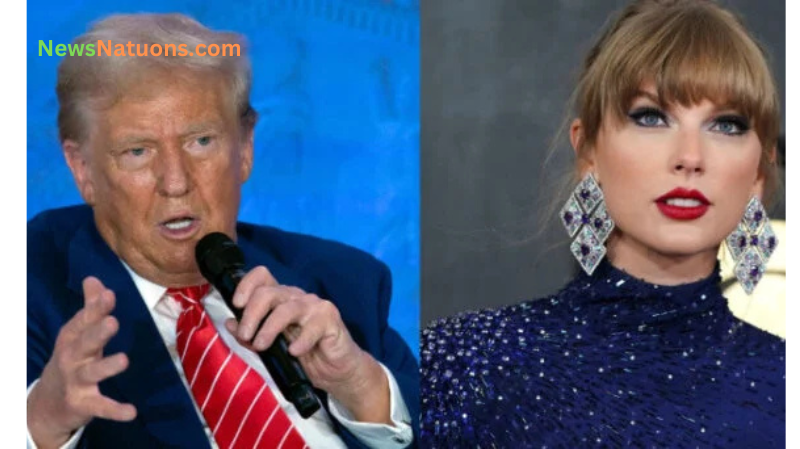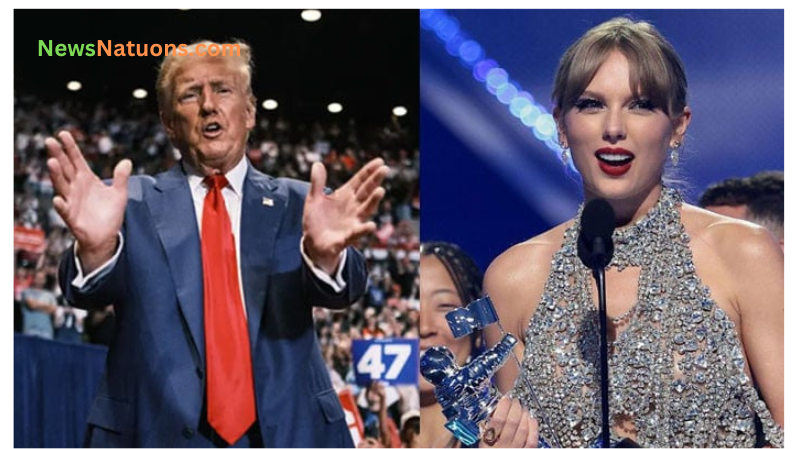Former U.S. President Donald Trump has stirred controversy once again—this time targeting globally acclaimed singer Taylor Swift. Known for his unfiltered remarks, Trump used his social media platform, Truth Social, to make a comment that many are labeling as sexist and disrespectful. In a recent post, Trump stated, “Has anyone noticed that since I said I hate Taylor Swift, she’s not ‘hot’ anymore?”
This remark has triggered widespread reactions across social media and news outlets, reigniting discussions about Trump’s ongoing tension with celebrities, especially those who have openly criticized him or supported his political rivals.
A History of Celebrity Feuds
Trump’s criticism of Taylor Swift is not new. Over the years, the former president has had a history of feuds with high-profile celebrities including Rosie O’Donnell, Meryl Streep, and LeBron James. What makes his latest attack notable is its personal tone. Instead of criticizing Taylor Swift’s music or political views, Trump chose to attack her physical appearance—a move many are calling petty and misogynistic.
Taylor Swift, known for her powerful voice, lyrics, and influence, has not directly responded to Trump’s latest comments, but her fans—famously called “Swifties”—have not held back. Many have taken to social media to defend her, calling out Trump’s comment as an example of outdated and harmful rhetoric.
Political Undertones in a Pop Culture Clash
Trump’s comments come at a politically sensitive time, with the U.S. 2024 presidential elections looming. Taylor Swift has been increasingly vocal in recent years about political issues. She endorsed Democratic candidates and has criticized policies and figures associated with Trump’s administration.
By targeting Swift, Trump could be attempting to mobilize his base, many of whom oppose celebrity involvement in politics. His followers often view Swift and similar artists as symbols of liberal elitism, making her a prime target for political attacks. But this strategy could also backfire by alienating younger, more progressive voters.
Social Media Explodes With Reactions
The comment sparked immediate backlash across platforms like X (formerly Twitter), Instagram, and TikTok. Many celebrities, political commentators, and fans slammed Trump for his sexist and ageist tone.
Some users pointed out the irony that Trump’s statement appeared to be rooted in personal vanity and insecurity rather than real political discourse. One user wrote, “Imagine being so fragile that a pop star not liking you makes you go on a rant about her looks.”
Others noted how inappropriate it is for a political figure—especially one who’s served as the President of the United States—to use such language in public. It sparked renewed calls for holding public officials to a higher standard of discourse.
Taylor Swift’s Resilience and Growing Influence
Despite the attack, Taylor Swift’s influence shows no sign of waning. Her recent Eras Tour has been one of the highest-grossing tours in music history. She continues to win awards, break records, and expand her global fan base.
Swift has also been gaining attention for her philanthropic work and her role in raising political awareness, especially among younger voters. From advocating for LGBTQ+ rights to encouraging voter registration, Swift’s cultural relevance extends far beyond her music.
While Trump’s comment might grab headlines, Swift’s consistent activism and artistic achievements continue to overshadow the negativity.
The Gendered Nature of Political Insults
This incident sheds light on a broader issue—the gendered nature of insults in politics and media. When female public figures are criticized, the attacks often focus on their appearance, age, or relationships, rather than their professional capabilities or political opinions.
By saying Swift is “not hot anymore,” Trump isn’t just offering a personal opinion; he’s reinforcing harmful stereotypes that a woman’s worth is tied to her looks. Such remarks set a dangerous precedent and distract from more meaningful discussions.
Public Figures and the Responsibility of Influence

As a former president and a prominent political figure, Donald Trump has a platform that reaches millions. His statements, even on social media, hold significant influence. Many critics argue that with such a platform comes responsibility.
Words carry weight, and when leaders use their influence to belittle or mock others—especially based on gender or appearance—it sends a damaging message to society. It undermines efforts for equality, respect, and mature political discourse.
What Comes Next?
It remains to be seen whether Taylor Swift will respond to the comment. Historically, she has chosen to respond to criticism through her music or advocacy rather than engaging in public spats.
However, the incident is likely to be discussed in upcoming interviews, think pieces, and debates around the role of celebrities in politics and the kind of discourse expected from leaders.
Swift’s fans continue to show support, while Trump’s critics use this moment to highlight the former president’s controversial approach to communication. Political analysts also suggest this could add fuel to cultural debates in the run-up to the 2024 elections.
Conclusion
Donald Trump’s comment about Taylor Swift being “not hot anymore” has triggered outrage and concern, highlighting persistent issues of sexism, power misuse, and celebrity-politics clashes. While Trump may have intended to stir controversy or rally his base, the backlash suggests that many Americans are tired of disrespectful rhetoric, especially when directed at successful, outspoken women.
Taylor Swift’s silence could speak volumes, as her work and advocacy continue to rise above the noise. In the end, the incident serves as a reminder of the importance of respectful dialogue and the powerful role celebrities and public figures play in shaping cultural and political narratives.











